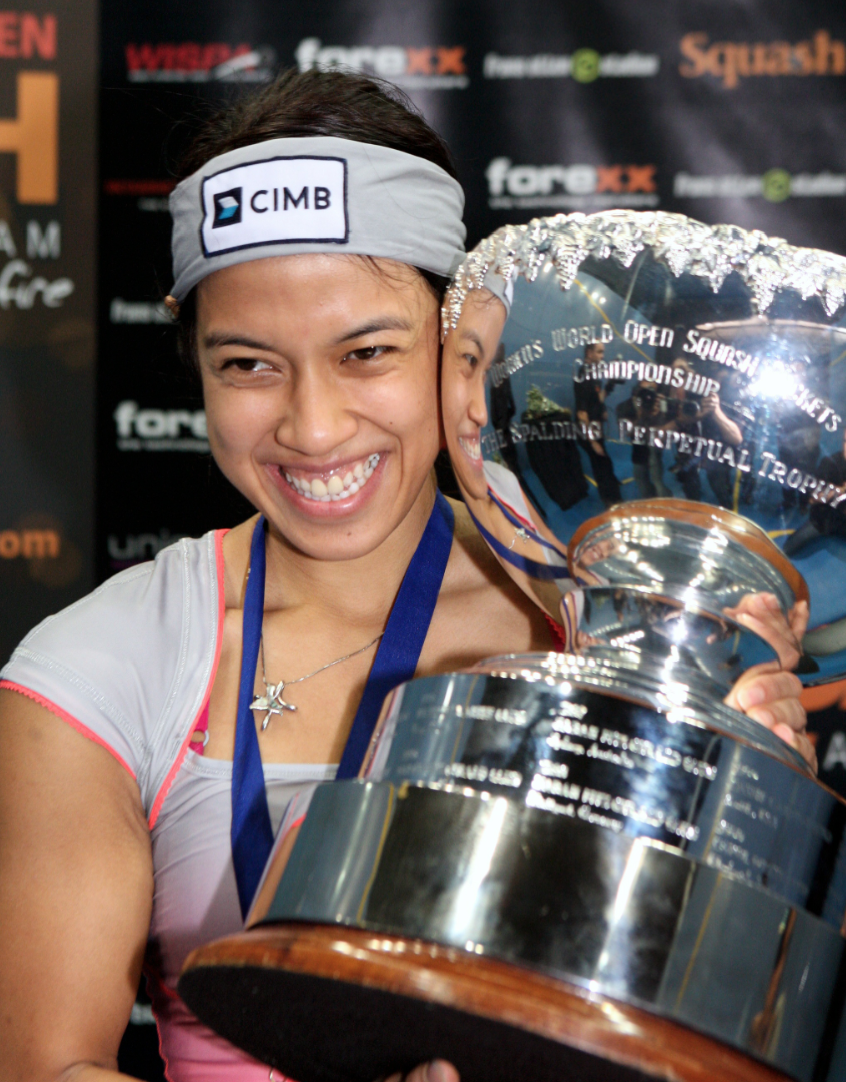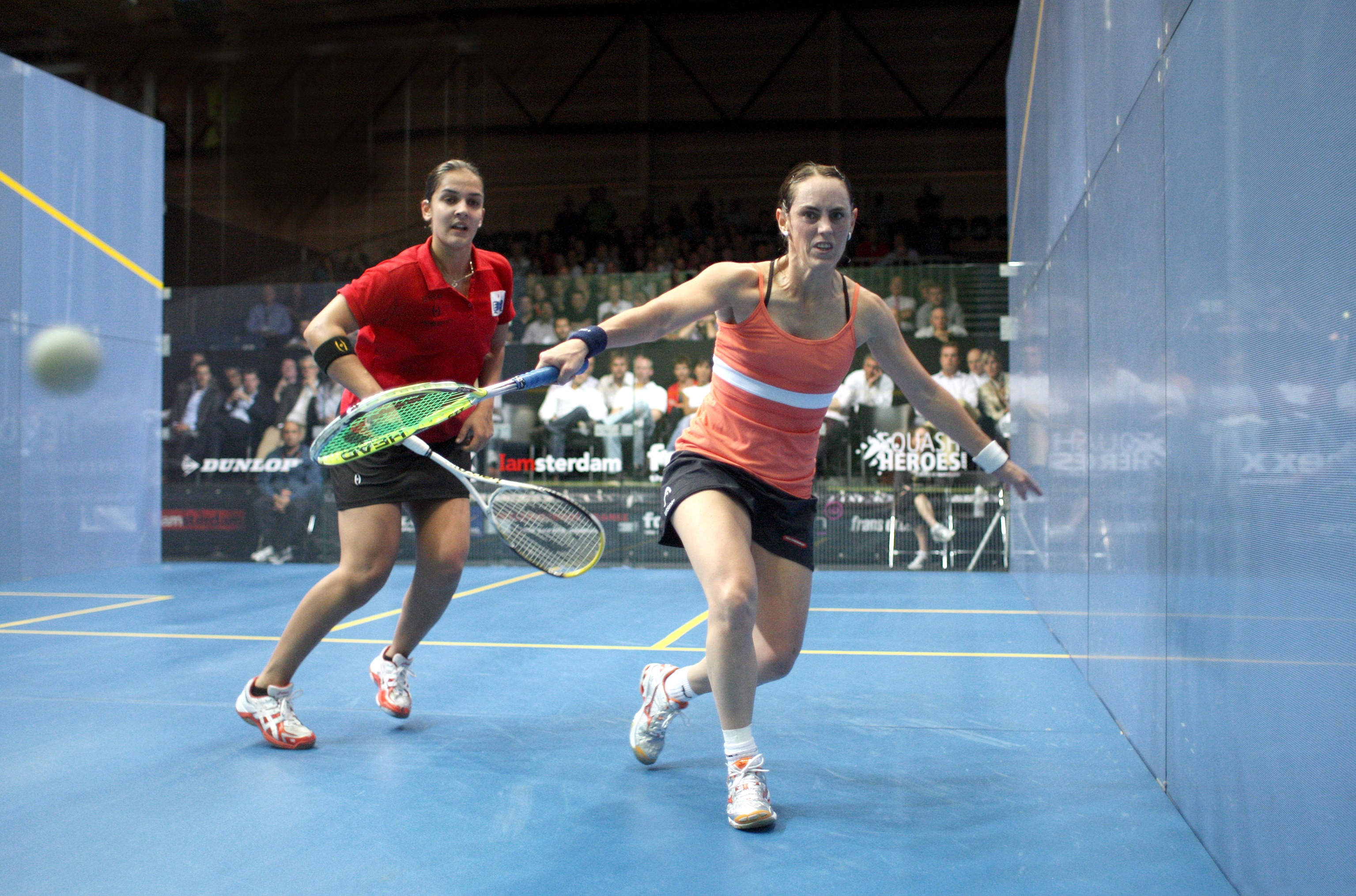
By Richard Eaton
Photos by Steve Line/SquashPics.com

The depth of the ordeal that Nicol David had endured became more apparent within moments of winning her fourth World Open after an initially hesitant but eventually beautifully taken 3-11, 11-6, 11-3, 11-8 victory over Natalie Grinham.
The heroine of all Asia sat down and began to unravel her thoughts to the encircling scribes, only for her sentences to collapse and the words to deteriorate into random syllables, eventually causing her to hang out her tongue in a gesture of defeat.
“Ugh, I don’t know what I’m saying,” she said. Minutes later, as she thanked her parents while receiving the trophy, her lips trembled, tears welled up, and the voice quavered, before she firmly recovered—rather as she had after a worrying opening 15 minutes of a superb final.
“I’m sorry, er, this is good,” she said, expressing relief that her emotions—relief, joy, and gratitude—were being ecstatically unlocked.
They were in great contrast to the emotions she had been experiencing before. Once again, it had almost been too much for the slight, vulnerable-looking lady with a responsibility so heavy here in the West it can be difficult to comprehend it.
Malaysia regards itself as one of the world-building brick countries, along with Brazil, Russia, India, China, and South Korea, ones which will profoundly influence the future of the planet, and it sees David, the possessor of the revered title of Datuk, the holder of its Order of Merit, not only as its highest profile athlete but as a propaganda tool in its destiny.
And so the relentless intensity of the expectations made failure unthinkable. At the same time it was hard for her not to think of it, having lost her British Open title only a fortnight before.
David’s performance then suggested that, strong in will and mind as she mostly is, when she loses it, she loses it big time. Her performance now suggested there were moments when the match might have slipped away from her, but she clung gamely on and prevailed.
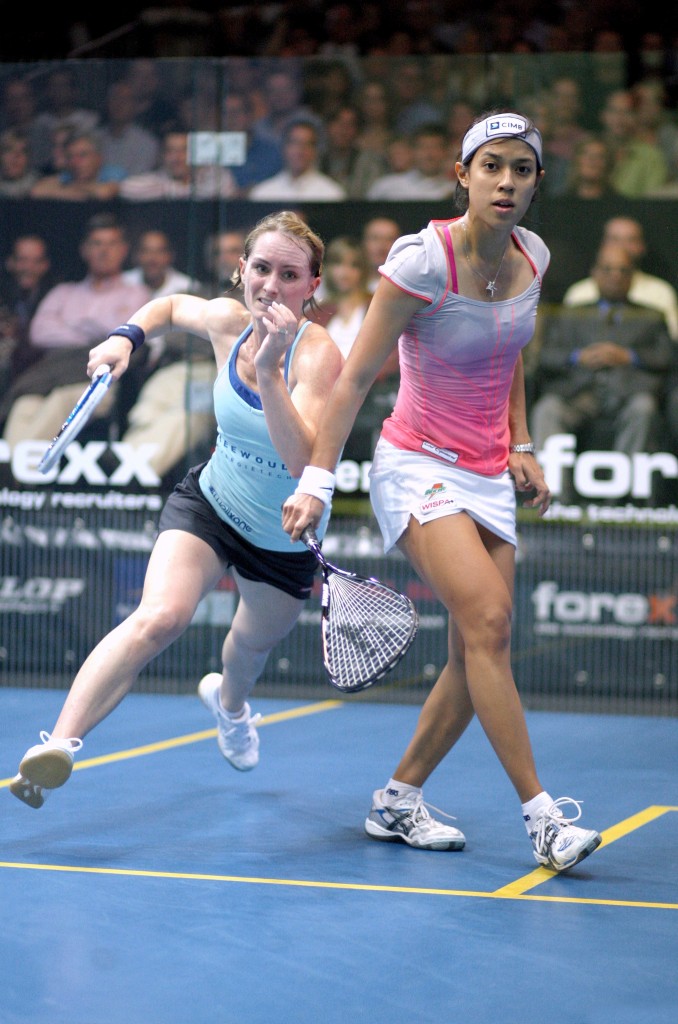
Once she had, the orgy of celebrity and the myth-making restarted. The prime minster of Malaysia, who once famously quipped that Nicol David was more famous then he, cannot have realized what he was triggering.
Now it was repeated for the umpteenth time for the benefit of another prominent man, the President of the Olympic Council of Malaysia, who is also a member of its royal family.
Before the television cameras he was asked: was she now more famous than him? Even Tunku Tan Sri Imran ibni Almarhum Tuanku Ja’afar was left with only one answer to that.
In fact, according to some people, Natalie Grinham had been at least even money to win this World Open. She had recovered well from a three-month struggle with whooping cough, had had some impressively one-sided wins en route to the final, and was moving beautifully.
She also had a sense of destiny in this tournament. Although Amsterdam has been David’s training base since 2006, an adopted home where she has plenty of supporters, Grinham has been there for a decade and put down even stronger roots.
Not only had the Australian acquired Dutch nationality last year and begun to play for The Netherlands, but her husband, the former Dutch No. 1 Tommy Berden, was the World Open’s tournament director.
To prepare for it, and to help him prepare for it, Grinham even skipped the British Open. De Telegraaf of Amsterdam was full of it. This was an event that had been made for the nation’s adopted daughter.
Moreover, she had shown she was prepared to fight to win it. Grinham had taken up boxing. It happened after she learned she had the same physio as Remy Bonjasky, a heavyweight kick boxer who has been three times a K1 World Grand Prix champion.
Grinham is apparently allowed to try to hit him, and he either ducks or takes the punches on the gloves, but responds only in slow motion when he makes a fist movement towards her.
Even when the fight situation is only simulated, it created a fear factor, a rush of adrenalin, which heightened her concentration fiercely. “That is something I can reproduce on the squash court,” she said.
“There are three elements,” said Berden. “One is excitement. She really enjoys it and comes back very energetic. Another is that she gets a great workout. It’s physically very good. She has to stay moving for an hour or 75 minutes.
“But the real reason she has been doing it is to get her level of focus higher in the later stages of matches. I think that’s why she has been losing to Nicol. She got so far and then couldn’t keep focus and get the discipline. And we all know that if Nicol sniffs something she steps up.”
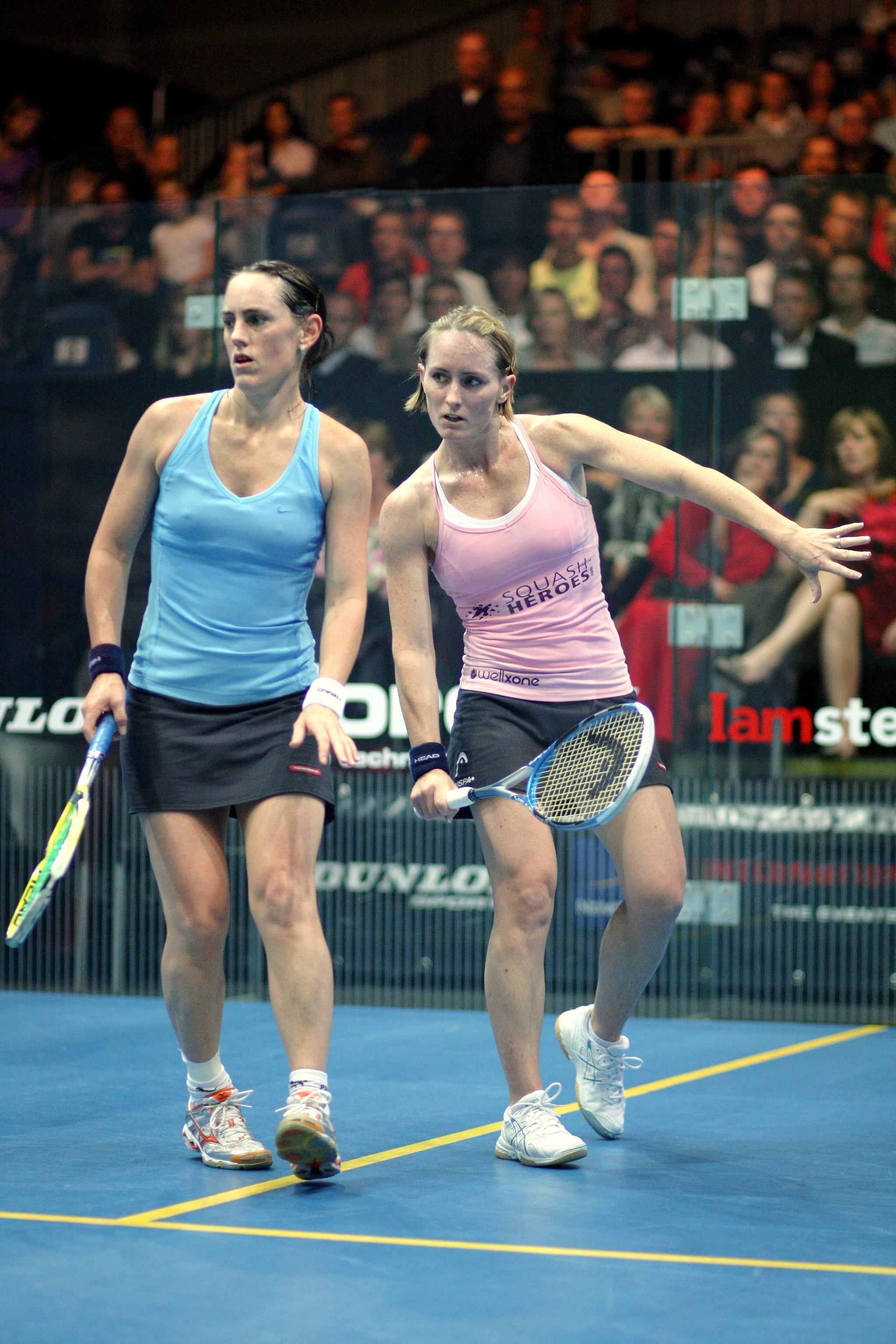
His words proved stunningly prophetic. Grinham could probably have won this final. For 20 minutes she played as though she would.
Then unaccountably, for no obvious reason, she did allow her opponent a sniff. The cost was immense. The scent galvanized a faltering David.
It happened with Grinham one game up and the score standing at 4-4 in the second. During the next seven rallies Grinham put one drop shot and two volley drops into the tin, helping her to regain a comforting parity at one-game all.
It visibly encouraged David. After that the match turned into a wonderful spectacle of flowing movement and varied patterns between two of the finest movers the game has seen, but the psychological advantage that Grinham had had, was gone.
It was not quite as good as their sensational World Open semifinal in Kuala Lumpur five years previously, which must rank as one of the greatest ever, and was won by Grinham. But it was superbly fluent and had its own tactical fascination, as David grew not only in confidence but in vision of how to win.
Instead of using her speed and movement to lure her opponent into taking the first risk, and then either punishing her with counter-attacks or wearing her down, David more often played a short ball first. She did so with accuracy—sometimes making the ball cling treacherously—frequently opening up the court well.
Then, following it with accurate driving, she took charge of more of the rallies, capturing the second and third games. But she was required to do much more.
That was because in the fourth game Grinham made a determined comeback. She increased her intensity, hit four balls to a perfect length, one with a stunning flick drive that was delivered with almost no back-swing, and advanced to 6-3.
David responded. She regained the serve with an enterprising drop, volley-drop combo, and continued to attack with a creativity that was something of a revelation, her short game proving accurate and reliable until the end.
That came with a squash-playing anti-climax but with a decision-making drama, one that Aussie referee Christine Sinclair will surely remember for the rest of her life.
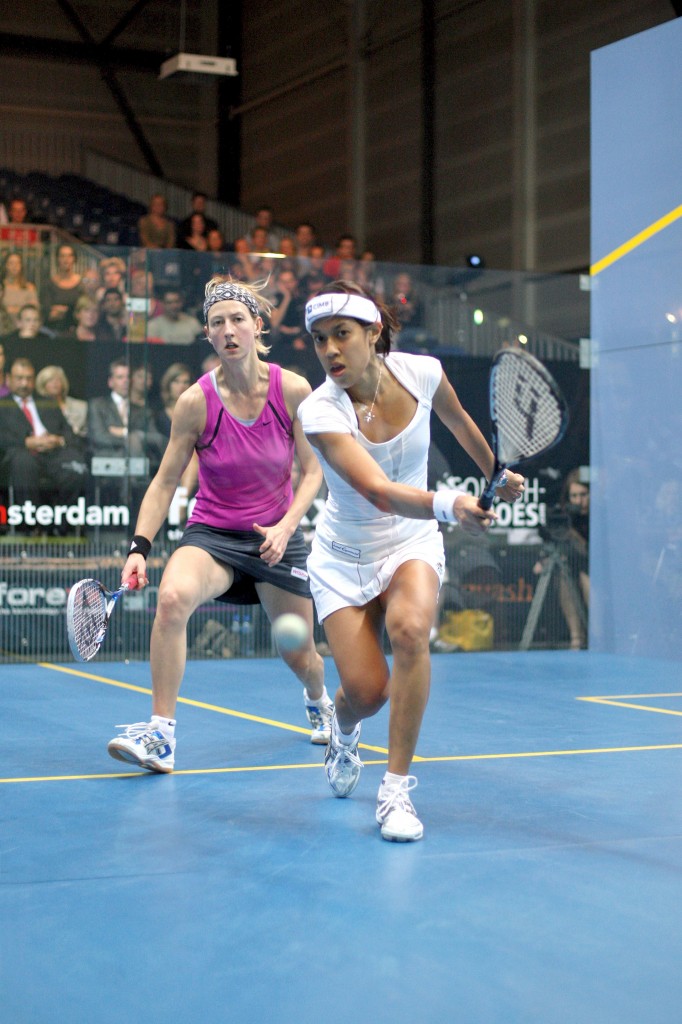
It happened after David delivered another fine volley drop that Grinham just scraped up, but in the process could not avoid bumping her opponent. Sinclair had the courage correctly to award a penalty stroke to finish the World Open final.
“I’m obviously disappointed, but I was up there with her most of the time,” said Grinham, though her thousand-yard stare suggested that disbelief was more obvious than disappointment.
David was asked if this the most important of her four World Opens. “Each had their own meaning,” she replied, sounding like a mystic.
Earlier in the tournament David had had to work to get past Jenny Duncalf and an impressive Alison Waters. Grinham had had it rather easier in her semifinal with elder sister Rachael, who was pretty much ironed out after having to come back from two games down against both Vanessa Atkinson and Omneya Abdel Kawy.
The meanings which each of David’s wins had, therefore, may have been technical as well as psychological. Sure, this one told us that it had been a huge emotional test that David had passed, and that she had done so with courage and adaptability. And sure, in big finals she has more experience than anyone.
But it also told us that when tournaments are played in unchanging glass court conditions, her athletic consistency will prosper. Both at this year’s British Open in Manchester and at the 2007 World Open in Madrid, she had been upset by the very different conditions of a two-court tournament—as well as by the unreal demands of a hundred million people or more.
And so this was one of the best women’s World Opens there has been, perhaps the best. The court was excellently presented, and it benefited the tournament that it was the only one upon which David had to play. The arena was splendid, the surrounds smart and congenial, and the ambience excellent. The sponsorship, from Forexx, a technology recruiting company, must have been substantial.
Berden did great organizational and public relations jobs, and was rewarded with the final he wanted. It may not have brought the result he wanted, but the role his wife played was still pretty heroic, for she ensured a gripping finish to a memorable week. And a rare finish too, for it was one in which the runner-up may be remembered almost as much as the winner.


